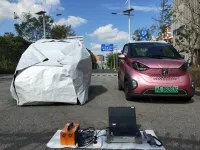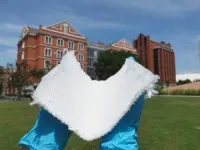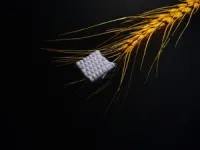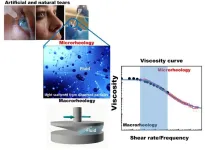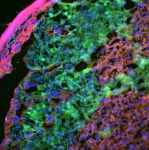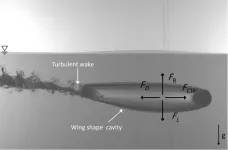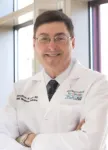(Press-News.org) When an electric vehicle is parked outside, its temperature can swing wildly from day to night and season to season, which can lead to deterioration of the battery. To dampen these fluctuations and extend the battery’s lifespan, researchers have designed an all-season thermal cloak that can cool an electric vehicle by 8°C on a hot day and warm it by 6.8°C at night. The cloak, made predominantly of silica and aluminum, can do so passively without outside energy input and operates without any modification between hot or cold weather. This prototype is described July 11 in the newly launched Device, an application-oriented sister journal to Matter, Joule, and Cell.
“The thermal cloak is like clothes for vehicles, buildings, spacecrafts, or even extraterrestrial habitats to keep cool in summer and warm in winter,” says senior author Kehang Cui, a materials scientist at Shanghai Jiao Tong University.
To dampen natural temperature fluctuations, the cloak isolates the car—or any other object beneath it—from the surrounding environment. The cloak has two components: an outer layer which efficiently reflects sunlight and an inner layer that traps heat inside. Whatever heat the outer layer does absorb is emitted in such a way that it can be readily dissipated to outer space. This design earns it the name of Janus thermal cloak, inspired by the two-faced Roman god Janus.
“The cloak works basically the same way the earth cools down, through radiative cooling” says Cui. “The earth is covered by the atmosphere, and the atmosphere is transparent to a certain range of electromagnetic energy we radiate.”
While this process is desirable in the summer, it would make the car colder during winter months. “You have to develop something that can turn on and off by itself without external energy input, and that's extremely difficult,” says Cui.
Cui and his team designed the cloak to automatically counteract this effect in the winter. The cloak employs an effect called “photon recycling”—essentially, any energy that is trapped under the cloak will bounce back and forth between the car and cloak rather than escape to the surroundings outside.
To assess the performance of the thermal cloak, the researchers conducted tests on electric vehicles parked outside under typical ambient conditions in Shanghai. While the cabin temperature of an uncovered car reached 50.5°C at mid-day, the cabin of the cloak-covered car reached 22.8°C—27.7°C lower than the uncovered car and 7.8°C lower than the temperature outside. At midnight, the covered car stayed 6.8°C higher than the temperature outside, never dropping below 0°C.
“This is the first time that we could achieve warming above the ambient temperature by almost 7°C during winter nights,” says Cui. “This is also kind of surprising to us—there’s no energy input or sunshine and we can still get warming.”
The outer component of the cloak is made of thin fibers of silica that were then coated in flakes of hexagonal boron nitride, a ceramic material similar to graphite that enhances the fibers’ solar reflectivity. These fibers are then braided and woven together into a fabric and adhered to the inner layer, which is made of aluminum alloy.
The team purposefully designed the cloak to make scaling up production easier in the future. For example, using thinner silica fibers would have increased solar reflectivity, but they would be weaker and couldn’t be made with high-volume, industrial-level production techniques already available. In addition, the materials used, including the aluminum, silica, and boron nitride, are all low-cost and make the cloak lightweight, durable, and fire-retardant.
###
This work was supported by the Science and Technology Commission of Shanghai Municipality and Shanghai Jiao Tong University.
Device, Qiao et al. “Scalable and durable Janus thermal cloak for all-season passive thermal regulation” https://cell.com/device/fulltext/S2666-9986(23)00008-X
Device (@Device_CP), is a physical science journal from Cell Press along with Chem, Joule, and Matter. Device aims to be the breakthrough journal to support device- and application-oriented research from all disciplines, including applied physics, applied materials, nanotechnology, robotics, energy research, chemistry, and biotechnology under a single title that focuses on the integration of these diverse disciplines in the creation of the cutting-edge technology of tomorrow. Visit http://www.cell.com/device/home. To receive Cell Press media alerts, contact press@cell.com.
END
WASHINGTON, July 11, 2023 – Compared to artificial tears, or eye drops, human tears are significantly more complex liquids, with a wide range of components including lipids, carbohydrates, proteins, water, and salt. It is this complex mixture that gives tears the perfect thickness and ability to moisturize the eye, a design that is hard to replicate with fewer ingredients.
In Physics of Fluids, from AIP Publishing, Vega et al. researched human tears at the micron level to reveal new ways of customizing artificial tears to address individual symptoms of dry eye disease. The detailed insights they gained about the composition and behavior ...
Unborn babies use ‘greedy’ gene from dads to ‘remote-control’ mums into feeding them extra food
Fetuses use a copy of a gene inherited from their dad to force their mum to release as much nutrients as possible during pregnancy, Cambridge scientists have discovered.
The unborn baby ‘remote controls’ its mother’s metabolism so the two are in a nutritional tug of war. The mother’s body wants the baby to survive but needs to keep enough glucose and fats circulating in her system for her own health, to be able to deliver ...
WASHINGTON, July 11, 2023 – Inspired by the need to safeguard marine animals and promote sustainable solutions within marine environments, an interdisciplinary team of researchers from King Abdullah University of Science and Technology in Saudi Arabia and Sofia University in Bulgaria are delving into the hydrodynamics of buoyant objects at the air-water interface.
By studying these dynamics, their goal is to expand the understanding of fluid hydrodynamics and complex surface interactions – and advance fields such as the design and performance of marine engineering systems, buoy systems, and ...
About The Study: The findings of this study suggest that personally mediated racial discrimination may be a risk factor for developing obesity in children and adolescents, above and beyond socioeconomic status. The results highlight the need for a multifaceted approach to address racial discrimination and its impact on the health of children and adolescents.
Authors: Adolfo G. Cuevas, Ph.D., of the New York University School of Global Public Health in New York, is the corresponding author.
To access the embargoed study: Visit our For The Media website at this link https://media.jamanetwork.com/
(doi:10.1001/jamanetworkopen.2023.22839)
Editor’s Note: Please ...
About The Study: In this cohort study of U.S. veterans, the findings suggest that those with atherosclerotic cardiovascular disease who reside in historically redlined neighborhoods continue to have a higher prevalence of traditional cardiovascular risk factors and higher cardiovascular risk. Even close to a century after this practice was discontinued, redlining appears to still be adversely associated with adverse cardiovascular events.
Authors: Sadeer Al-Kindi, M.D., of University Hospitals in Cleveland, and Salil V. Deo, ...
July 11, 2023 (BOSTON) – A new national study, led by researchers at Tufts Medical Center in Boston, has found whole genome sequencing (WGS) to be nearly twice as effective as a targeted gene sequencing test at identifying abnormalities responsible for genetic disorders in newborns and infants. The study, “A Comparative Analysis of Rapid Whole Genomic Sequencing and a Targeted Neonatal Gene Panel in Infants with a Suspected Genetic Disorder: The Genomic Medicine for Ill Neonates and Infants ...
Children who experience racial discrimination are more likely to later have a higher body mass index (BMI) and larger waistline, according to a new study published in JAMA Network Open. The findings illustrate that racial discrimination may be a risk factor for young people developing obesity—above and beyond other socioeconomic factors such as family income.
“Exposure to racial discrimination must be acknowledged as both a social determinant of obesity and a significant contributor to obesity disparities among children and adolescents,” said Adolfo Cuevas, assistant professor of social and behavioral sciences at the NYU School of Global Public Health and the study’s ...
BOSTON – The first large-scale U.S. clinical trial of cytisinicline, led by a Massachusetts General Hospital (MGH) investigator, found the smoking cessation medication to be effective and well tolerated in adults who wished to break their nicotine dependence. In the Phase 3 study published in JAMA, researchers reported that cytisinicline could offer adults who smoke a potential new treatment option.
“Cigarette smoking remains the leading preventable cause of death worldwide, yet no new smoking cessation medication has been approved by the U.S. Food and Drug Administration for nearly two decades,” says Nancy Rigotti, MD, director of MGH’s ...
That experiences leave their trace in the connectivity of the brain has been known for a while, but a pioneering study by researchers at the German Center for Neurodegenerative Diseases (DZNE) and TUD Dresden University of Technology now shows how massive these effects really are. The findings in mice provide unprecedented insights into the complexity of large-scale neural networks and brain plasticity. Moreover, they could pave the way for new brain-inspired artificial intelligence methods. The results, based on an innovative “brain-on-chip” technology, are published in the scientific journal Biosensors and Bioelectronics.
The Dresden researchers explored ...
BINGHAMTON, N.Y. -- A strange mystic swings a pocket watch back and forth, repeating the phrase “You’re getting sleepy, very sleepy,” giving them absolute command over their subject. That’s not how hypnotism really works, but it’s the way it’s often depicted in pop culture. Even some clinicians and hypnosis educators propagate harmful myths about hypnosis.
Steven Jay Lynn, a professor of psychology at Binghamton University, State University of New York, is an expert on hypnosis who has made major contributions to the judicial system ...
